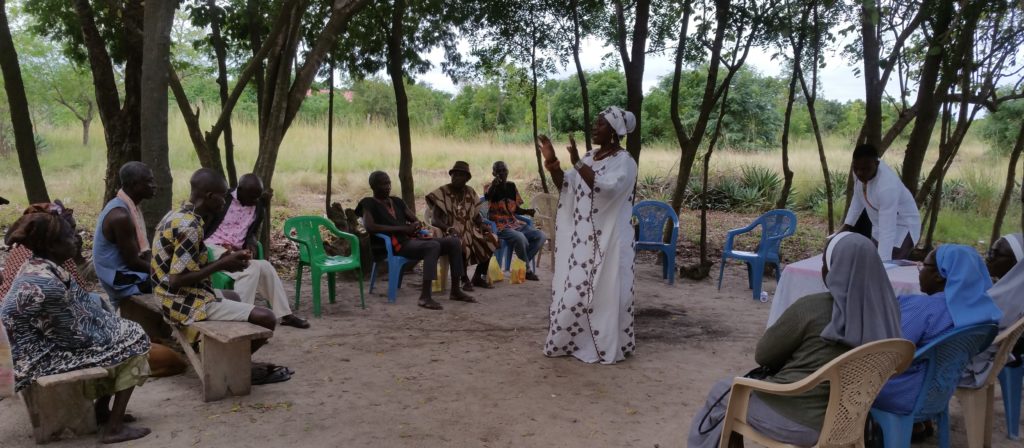Who Polluted Kelor and Kolor Water Streams? The people of Kelorkpo (in North Tongu in Battor) are facing a devastating challenge: pollution of their water streams: Kelor and Kolor. The two streams important to their livelihoods are allegedly contaminated by runoff water from a corn farm belonging to a company called Kop Farms. Africa Faith and Justice Network (AFJN) learned this information on August 31, 2022 during the town hall meeting in Kelorkpo to promote awareness on land grabbing and responsible investments. No relationship exists between Kop Farms and the people of Kelorkpo other than Kop’s having polluted their water streams. Kop had leased no land from the community.
When we went to inquire at the company’s local office, we learned from its representatives that three communities are affected. As of September 2022, Kop Farms was temporarily pumping water from the Volta River to two of the communities. The third does not have access to water pumped from the Volta. We were told, however, that efforts are being made to make this possible. The representatives claim they have no obligation to provide water to these communities. Instead, it is out of kindness that they are using their fuel for a good portion of the year to provide water to these communities.
We were also informed that the company has conducted a lab analysis to determine whether the pollutants found in the streams match the chemical compounds found in the product they use in the company’s corn farm. Test results were sent to a specialist for accurate interpretation and the company is waiting for the conclusion. If it is determined that the chemicals in the polluted streams are not found in the products they use on the farm, the company will certainly discontinue the provision of water to the community.
However, the people in Kelorkpo are demanding a permanent solution. In fact, they argue that while the water of the two streams has been contaminated by Kop Farms, even the Volta water is not safe for drinking. They allege that a nearby cassava processing plant is dumping pollutants into the river. We witnessed the plant’s canal containing liquid from cassava processing, but we have not independently verified whether this is toxic. We photographed the plant only at night and our local partners were terrified doing so. The question is how many more contaminated streams are affluents of the Volta River? What are the health implications for the people who use the water and the biodiverse species that call the river home?
Additional challenges for the people of Kelorkpo

The people of Kelorkpo are facing an additional and equally devastating challenge: land grabbing. Two weeks prior to our visit to Kelorkpo village on 31 August 2022, in this traditional area of Battor in Ghana’s Volta Region, members of the community saw heavy machines plowing their farms, destroying crops without prior notification. They alleged that Mr. Kwesi Aziza Akwetteh had leased the land without informing even the chief, Togbe Gbavu II. Kwesi Aziza Akwetteh is the grandson of the family patriarch, Akwetteh, the actual owner of the land that all of them live on and farm. One after another, participants stated that the land is very much contested. Because Kwesi did not attend the town hall meeting, his side of the story could not be known. A company always needs to ensure that the land it is leasing is not claimed by multiple owners.
Mr. Akwetteh George, a cousin who attended the town hall meeting, said that since they have taken his land, he plans to relocate to the Eastern Region to find farmland. Ms. Sonexor Agbafa, a maternal granddaughter of the patriarch, said that they had uprooted her cassava. Koffi Akwata also known as King George, a paternal grandson of the patriarch, lost a plot where there was a house. Another man said that he had lost six acres.
As these people are all related to the elder Akwetteh, the division within the family over this land is a barrier to defending their common interests. Also, this new industrial form will certainly contribute to the water pollution, making their lives more challenging.
by Jacques Bahati, Policy Analyst and Thoughts Leader , Edited by Br. David P. Mahoney, CFX
